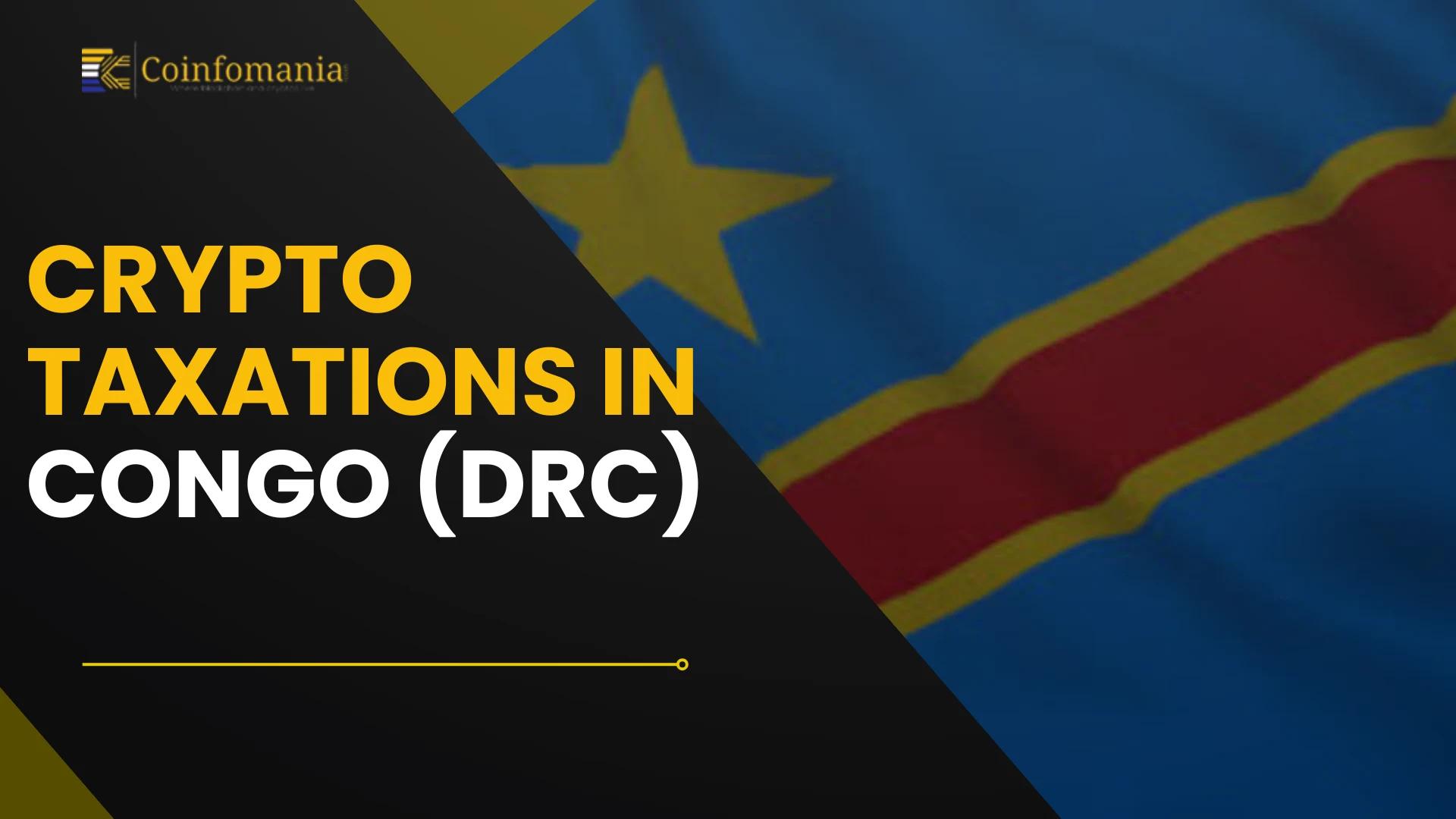Crypto Taxation in Congo (DRC)
Cryptocurrency is gradually but informally established in the Democratic Republic of Congo (DRC). Not in consideration as legal tender, the government of DRC announced a withholding tax of 5% on the conversion of crypto into fiat amounts equal to or above $5,000 in the year 2025. Furthermore, crypto platforms should also obtain a license from […]

Cryptocurrency is gradually but informally established in the Democratic Republic of Congo (DRC). Not in consideration as legal tender, the government of DRC announced a withholding tax of 5% on the conversion of crypto into fiat amounts equal to or above $5,000 in the year 2025. Furthermore, crypto platforms should also obtain a license from the Digital-Asset Service Provider for their legal operation. An evolving landscape of crypto tax implications in Congo would help traders, miners, and businesses avoid penalties. Taxes are governed by the General Directorate of Taxes (DGI), which applies existing legislation to cryptocurrencies until the special regulations are finalized.
Tax Authorities & Regulations
- Tax Institute: General Directorate of Taxes (DGI)
- Tax Regulation Body: The Central Bank of Congo (BCC) has a consideration for crypto but does not prohibit its transactions.
- Legal Status: Crypto is legally permissible but does not qualify as legal tender.
- Key 2025 Changes:
- 5% withholding tax on large crypto-to-fiat conversions.
- DASP licensing is required for exchanges and trading platforms.
- Classification: Cryptocurrencies are treated as taxable assets, not currency.
Types of Crypto Taxes in Congo (DRC)
The Democratic Republic of Congo has put in practice taxes on cryptocurrency transactions, additions to the traditional existing regulatory environment for finance in the country, and new provisions on digital assets. The following are the applicable major taxes:
- Tax Withholding: 5% on all crypto conversions above $5,000.
- Capital Gains Tax: Applied per the general tax laws, so no crypto-specific rates yet.
- Corporate Tax: 28% (expected to rise to 30% by the end of 2025).
- Personal Income Tax: Up to 40% for high earners.
- No VAT/GST on crypto transactions.
This framework represents the Congo (DRC)’s initial steps toward formalizing cryptocurrency taxation while maintaining alignment with conventional financial policies.
Tax Rates & Brackets
In the Democratic Republic of Congo, very clear tax rates have been established for cryptocurrency activities under new digital asset provisions and the application of existing financial regulations. These rates, therefore, form the basis of crypto taxation in an ever-evolving financial landscape in the country.
- Withholding Tax: 5% on crypto-to-fiat over $5,000.
- Corporate Tax: 28% (increasing to 30%).
- Personal Income Tax: Progressive up to 40%.
- No exemptions for small traders yet.
Crypto Transactions & Tax Treatment
The Democratic Republic of Congo has various cryptocurrency-related tax treatments within its federal tax law, creating a regulatory framework dynamically related to the evolving digital economy. These rules specify when and how taxation on different transaction types works.
- Buying Crypto: Nothing taxable on buying crypto, but one has to keep records.
- Selling Crypto: 5% tax if converting over $5,000 to fiat.
- Crypto-to-Crypto Trades: No tax unless converted to fiat.
- Mining & Staking: Taxed as business income if done commercially.
- DeFi & NFTs: No clear rules yet; general tax principles apply.
Crypto Tax Reporting & Compliance
Proper tax reporting ensures legal operation within Congo’s financial system while avoiding penalties. As the Congo (DRC) develops its crypto regulations, maintaining compliance demonstrates good faith engagement with emerging digital economy frameworks.
- Self-Reporting: Traders must declare crypto earnings
- Required Documents: Transaction logs, wallet addresses, exchange statements
- Deadlines: Conform to regular periods of taxation filing
- Sanctions: Fines or audits for late submissions
Setting up compliant systems paves the way for businesses and traders to prepare for new regulations that will be introduced in the future in the budding cryptocurrency environment in the Democratic Republic of the Congo.
Tax Deductions & Exemptions
The Congo (DRC) deduction framework serves dual purposes: encouraging legitimate crypto business growth while maintaining fair taxation. These provisions help offset the operational challenges of digital asset activities while preventing abuse of the tax system.
- Business Expenses: Miners and traders can deduct operational costs.
- Losses: Can offset gains if properly documented.
- No personal exemptions for retail investors.
Enforcement & Penalties for Non-Compliance
The tax authority of the Democratic Republic of Congo (DGI) has commenced the establishment of bottlenecks for controlling cryptocurrency transactions, more specifically, coin interactions within banks and intermediary licensed exchanges. Although full-blown audits of crypto activities have not yet begun, the government continues to shape tools for identifying non-compliance.
- DGI monitors bank and authorized exchange crypto-fiat conversions.
- Tax Evasion Risks: Fines, back taxes, or legal action.
- So far, there are no strict audits, but compliance is advisable.
These enforcement measures are supposed to ensure a fair digital economy while slowly creating laws to regulate the crypto market.
Future of Crypto Taxation in Congo (DRC)
The Congo cryptocurrency ecosystem shows promise for growth, with 2025 projections estimating $1.7 million in market revenue and $5.7 average revenue per user. While there are challenges to adoption-perhaps best illustrated by regulatory gaps and infrastructure, the government is now taking forward steps.
For one, the exploration of a TON blockchain-based stablecoin and drafting of clearer crypto tax laws by 2026 have now become exigent. These efforts are designed to stimulate innovation in a great while giving due regard to taxation and supervision. As the market matures, stakeholders should prepare for evolving regulations that could shape the digital economy of the country.
Conclusion
The evolving crypto tax framework of Congo (DRC) balances regulation with innovation. While current rules remain limited, the 5% withholding tax and DASP licensing mark progress. Traders should maintain compliance as the government develops clearer policies. The plans to include stablecoin in the country of Congo, the crypto economy is very promising for success and shows resilience even though there is little infrastructure to hold onto.
FAQs
1. Are peer-to-peer (P2P) crypto trades taxable?
P2P transactions are not explicitly taxed unless converted to fiat. However, large or frequent trades may attract scrutiny under general income tax rules.
2. How are crypto airdrops and forks taxed?
Airdrops and hard forks are not clearly regulated yet, but could be treated as taxable income if converted to fiat.
3. Do foreign investors pay taxes on crypto gains in the Congo (DRC)?
Non-residents are generally not taxed on crypto gains unless operating a registered business in the Congo (DRC).
4. Will the Congo (DRC) impose stricter KYC rules for crypto users?
With DASP licensing, exchanges must follow AML/KYC rules, but individual wallet holders face minimal reporting requirements for now.
5. Is there a threshold for small crypto traders to avoid taxation?
No, the 5% withholding tax applies to all qualifying conversions over $5,000, regardless of trader size.
Follow us on Google News
Get the latest crypto insights and updates.
Related Posts

India Allows Global Trade Payments in Rupees to Reduce Dollar Use
Shweta Chakrawarty
Author

South Korea and Vietnam eye $150B trade despite Trump tariff
Shweta Chakrawarty
Author

Is U.S. Tariff Heat Bringing Russia, India, China Back Together?
Shweta Chakrawarty
Author